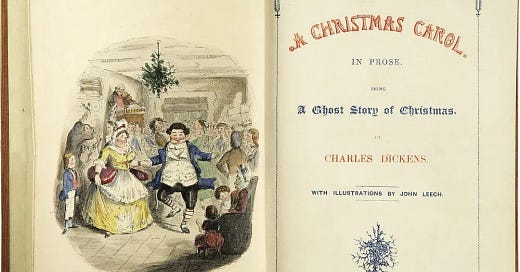Charles Dickens wrote A Christmas Carol for two reasons, one of which was dead simple - he needed money. His American lecture tour, itself a fundraising effort, didn’t pull in the pounds CD had hoped for. In fact, it had proved costly. Perhaps the charming story of an old man’s redemption would be remunerative. Convincing the author to put the tale in book form, however, was a hill to climb for the publisher, Chapman & Hall. Dickens wanted instead to publish a hectoring pamphlet on the horrors of child labor, which he experienced first hand in a boot blacking [shoe polish] factory. When he was at last convinced otherwise, the foundation for the iconic 1843 story was laid. The other reason behind the tale was more complex.
The idea for A Christmas Carol actually originated in the north of England when Dickens traveled to speak at the Manchester Athenaeum, a sort of philanthropic organization for the working poor - a population that was largely uneducated, powerless, exploited by factory owners and ignored by everybody else. It reminded the author of his own grim childhood.
In addition, in early 19th Century Britain - and before - Christmas was deeply unpopular among the upper classes, an excuse, it was thought, for the lower orders, like the very people he spoke to in Manchester, to get drunk and debauch.
You can hear the contempt in Scrooge’s voice when he says to Bob Cratchit of Christmas, “I suppose you’ll want the whole day off”.
In the story, Cratchit brags of excess: two full rounds of gin punch for his wife and children.
The next day, he’s hungover and late to work. “I am behind my time, Sir,” he tells his employer. “I was making rather merry.”
A Christmas Carol was an instant best-seller and ended up changing the Victorian view not only of Christmas, but of rich versus poor and the scourge of child labor, as well.
The story was an appeal for kindness over greed, of charity over gain. It was, and is, Liberal versus Conservative, hard truths versus fiction.
Welcome to 1843 - and to 2025, as well. Merry Christmas.




I always wonder why at one time ghost stories were popular Christmas fare?